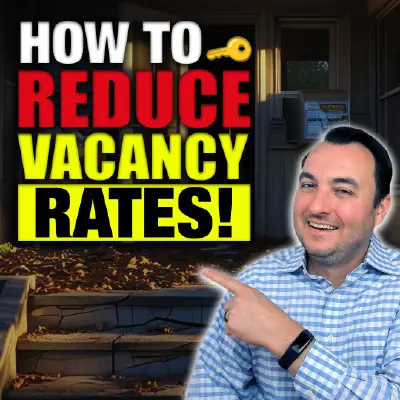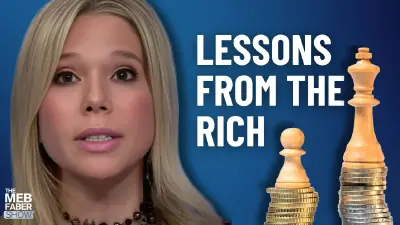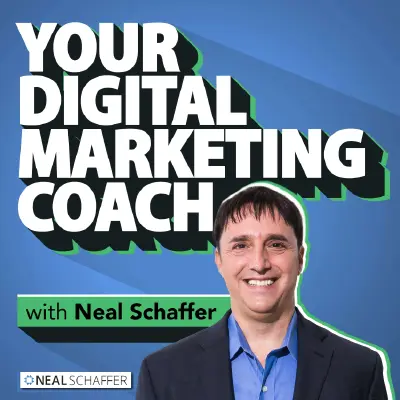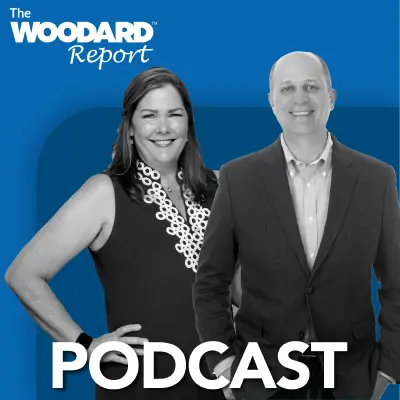Podcasts about Management
Episodes about Management

Is your rental unit sitting vacant longer than expected?
In this Strategy Saturday episode, Charles Carillo dives into the hidden costs of vacancy and shares the key strategies he uses to reduce downtime, increase lease renewals, and keep units filled. Whether you're managing a duplex, multifamily, or turnkey rental, you’ll learn how to avoid common marketing mistakes, improve tenant retention, and ultimately boost your NOI.
Charles covers everything from listing photos and tenant screening to early lease renewals and fraud prevention — plus he shares why most landlords lose money before the tenant ever moves in.
Mentioned Episodes:
SS74: What is the Difference Between Physical and Economic Vacancy - https://youtu.be/QDc-P15oRro
SS151: Understanding Vacancy and Make Ready Costs - https://youtu.be/AzpgO6yLTTM
SS230: Stop Wasting Money on Upgrades | Do These Instead for Higher Rents - https://youtu.be/2QwLnQNhZiM
Subscribe to never miss a weekly dose of real estate investing insights!
Connect with the Global Investors Show, Charles Carillo and Harborside Partners:
◾ Setup a FREE 30 Minute Strategy Call with Charles:
http://ScheduleCharles.com
◾ Learn How To Invest In Real Estate: https://www.SyndicationSuperstars.com/
◾ FREE Passive Investing Guide: http://www.HSPguide.com
◾ Join Our Weekly Email Newsletter: http://www.HSPsignup.com
◾ Passively Invest in Real Estate: http://www.InvestHSP.com
◾ Global Investors Web Page: http://GlobalInvestorsPodcast.com/

Mike Paulus shares investment strategies for entrepreneurs. Mike is the founder of PCM Encore, a fiduciary wealth management firm that builds customized portfolios using proprietary technology. He’s an expert in portfolio management and capital efficiency. Listen for six action items you can use today to navigate current market challenges, build resilient portfolios, and your reach long-term financial goals. Host, Kevin Craine Do you want to be a guest? https://Everyday-MBA.com/guest This episode is supported by the Naveen Jindal School of Management

Jul 11, 2025
Sponsorship and Manchester United: conversations with Qualcomm CMO Don McGuire and Utd Chief Business Officer Marc Armstrong
Leaders Sport Business Podcast ❭
Manchester United have remained a market leading force in commercial activity despite a run of challenging seasons for onfield performance and results. Current front-of-shirt partner Snapdragon, a mobile phone chip manufacturing brand within the Qualcomm software empire, is entering the second year of a five-year deal worth a reported $375 million. It's a top-end fee for a position at a club that finished 15th last season. On the show this week, Qualcomm CMO Don McGuire and newly installed Manchester United Chief Business Officer Marc Armstrong join James Emmett to talk about how to make commercial and marketing impact through a challenging era of transition.

Jul 11, 2025
Goldman Sachs’ Sara Naison-Tarajano - Family Office Whisperer | #590
The Meb Faber Show - Better Investing ❭
Today’s guest is Sara Naison-Tarajano, Global Head of Private Wealth Management Capital Markets and Goldman Sachs Apex. Sara has been at Goldman Sachs for over 25 years, and currently leads a worldwide platform that delivers multi-asset trading, financing, and direct-investment opportunities to some of the firm’s largest family offices.
In today’s episode, Sara runs through her career at Goldman Sachs, and the distinct approach required for family office investing. She explores the unique balance of risk management and growth that helps protect generational wealth, as well as the importance of alternatives in these strategies. Finally, Sara covers networking opportunities, market insights, and the most common challenges that affect family offices.
(0:00) Starts
(1:53) Sara's role at Goldman Sachs
(7:12) Challenges faced by wealthy families
(14:02) Concentrated wealth for family offices
(23:31) Portfolio strategies and alts
(30:40) Asset allocation and educating the next generation
(37:39) Insights from Goldman Sachs family office conference
(43:18) Risk management and market outlook for 2025
-----
Follow Meb on X, LinkedIn and YouTube
For detailed show notes, click here
To learn more about our funds and follow us, subscribe to our mailing list or visit us at cambriainvestments.com
-----
Sponsor: YCharts enables financial advisors to make smarter investment decisions and better communicate with clients. Get 20% off your initial YCharts Professional subscription when you start your free trial.
Follow The Idea Farm: X | LinkedIn | Instagram | TikTok
-----
Interested in sponsoring the show? Email us at Feedback@TheMebFaberShow.com
-----
Past guests include Ed Thorp, Richard Thaler, Jeremy Grantham, Joel Greenblatt, Campbell Harvey, Ivy Zelman, Kathryn Kaminski, Jason Calacanis, Whitney Baker, Aswath Damodaran, Howard Marks, Tom Barton, and many more.
-----
Meb's invested in some awesome startups that have passed along discounts to our listeners. Check them out here!
-----
Editing and post-production work for this episode was provided by The Podcast Consultant (https://thepodcastconsultant.com).
Learn more about your ad choices. Visit megaphone.fm/adchoices

This episode of the Woodworking Network podcast was sponsored by FDMC magazine. FDMC magazine is your vital source of information to improve your woodworking business. Whether it is keeping you apprised of the latest advances in manufacturing, helping you solve your wood technology problems with Gene Wengert, or inspiring you with case histories about successful businesses and best practices, FDMC magazine is there to be the sharpest business tool in your shop. Learn more and subscribe for free at woodworkingnetwork.com/fdmc.Woodworking Network is a home for professional woodworkers, presenting technology, supplies, education, inspiration, and community, from small business entrepreneurs to corporate managers at large automated plants.You can find all of our podcasts at WoodworkingNetwork.com/podcasts and in popular podcast channels. Be sure to subscribe so you don’t miss an episode. Thanks again to today’s sponsor, FDMC. If you have a comment or topic you’d like us to explore, contact me at will.sampson@woodworkingnetwork.com. And we would really appreciate it if you fill out the survey at woodworking network.com/podcast-survey. Thanks for listening.Intro music courtesy of Anthony Monson.

In this bold and honest episode, JM Ryerson sits down with leadership expert Jeff Hancher to tackle one of the toughest challenges today: giving firm feedback in a fragile world. From Jeff’s rise as a truck driver to a Fortune 500 leader and entrepreneur, his journey is packed with real lessons on courage, accountability, and transformation.Jeff breaks down the fears that hold leaders back (Fallout, Emotion, Amateur, Retaliation) and offers a mindset shift: stop asking “What if I have this conversation?” and start asking “What if I don’t?” You’ll hear how tough feedback changed Jeff’s life and why leadership is about earning the right to be both candid and caring.Whether you lead a large team or just yourself, this episode will push you to embrace discomfort, see conflict as a growth tool, and lead with strength and heart.Key takeaways:Why firm feedback is the ultimate act of care — and how to deliver it effectivelyThe fears stopping leaders (and how to overcome them)How to stop trading respect for popularityA critical mindset shift that reframes feedback as a gift, not a threatPractical tools to create a culture of growth, not resentmentJeff’s personal story of transformation and courageListen now and learn to lead with courage and clarity. Your team (and your future self) will thank you. Let’s go win.Watch episodes on YouTube and subscribe to our channel for inspiration on business, leadership, growth, mindset, and tips for living HAPPY, HEALTHY, and WEALTHY! https://www.youtube.com/@letsgowin

Jul 09, 2025
Organize, Follow Up, Grow: A New Digital Marketing Mindset
Your Digital Marketing Coach with Neal Schaffer ❭
Today we’re going to talk about something that can change the way you grow your brand — how you follow up. So many people focus on getting new followers, but the real gold lies in the people you’ve already talked to. It’s easy to lose track of warm leads, superfans, and partners when your messages are buried in your DMs and emails, which is why organizing your contacts and creating a system for follow up is so important. When you have a personal CRM, you stop leaving money and relationships on the table and start to stay top of mind. You also are able to turn connections into real growth for your brand and business.My recommended tool from this episode: KondoLearn More: Buy Digital Threads: https://nealschaffer.com/digitalthreadsamazon Buy Maximizing LinkedIn for Business Growth: https://nealschaffer.com/maximizinglinkedinamazon Join My Digital First Mastermind: https://nealschaffer.com/membership/ Learn about My Fractional CMO Consulting Services: https://nealschaffer.com/cmo Download My Free Ebooks Here: https://nealschaffer.com/books/ Subscribe to my YouTube Channel: https://youtube.com/nealschaffer All My Podcast Show Notes: https://podcast.nealschaffer.com

Jul 09, 2025
No More Almost: How to Escape the Loop That’s Keeping You Stuck (feat. Beth Allison)
Upscale Your Coaching Business Podcast ❭
You’re doing all the things—but the breakthrough never quite lands. Sound familiar? In this episode, we’re talking about the sneaky loop that keeps high-performers stuck in “almost” mode: almost launched, almost booked out, almost confident.If you’ve been spinning in cycles of planning, pivoting, or perfecting, it’s time to name what’s really holding you back—and get free. You’ll learn how to spot the moment your momentum stalls, what drives the loop, and what it takes to finally complete the move you keep putting off. No fluff, no hacks—just straight talk and practical shifts to help you break through, not burn out.Whether you're a coach, creator, or entrepreneur tired of “almost,” this one’s for you.Contact Beth Allison:https://www.linkedin.com/in/beth-allison-mid-life-mentor-and-coach-9512122/www.withinucoaching.comJoin our free 5-day M.A.P. Workshop (Monetize, Accelerate, Prosper) and discover how to create meaningful progress and profits in your coaching business. Whether just starting or ready to scale, this workshop offers the momentum and clarity needed to succeed. Register here: https://upscaleyourbusiness.com/5-day-map

Jul 09, 2025
Special Edition - Joe Woodard's guest appearance on After The First Million
The Woodard Report Podcast: Featuring Heather Satterley and Joe Woodard ❭
On this episode Joe Woodard is interviewed by Matt Tate, CEO of Decimal, about how accounting and bookkeeping firm owners can scale past the “messy middle” and into million-dollar practices. Joe emphasizes defining an ideal client, building outcome-driven service offerings, and pricing based on value rather than effort. He breaks down the path to $1M as achievable with just 32 right-fit clients, and explains how process, tech, outsourcing, and mindset shifts—especially moving from technician to business owner—are key to scalable success. Learn more about the show and our sponsors at Woodard.com/podcast

Jul 09, 2025
How Movement + Mindfulness Elevates Our Art and Energy as Photographers I Ep 170
Shine and Thrive Photography Podcast ❭
What if tuning into your body could unlock more creativity, clarity, and connection in your photography work? In this heartfelt episode, I’m joined by photographer and podcast host Danika, for a free-flowing conversation on the role that movement and mindfulness play in helping us stay grounded, inspired, and intentional — both behind the lens and in life. We talk about what movement looks like beyond exercise — how it helps photographers regulate energy, access joy, and stay present in high-pressure moments. From puddle-jumping in the rain to mindful post-wedding workflows, Sara shares powerful insights on staying connected to your body and creativity. Our conversation took some personal turns as we reflected on birth and motherhood, marveling at how capable and wise our bodies truly are. It all tied back to the episode’s theme: the importance of listening inward. The conversation flowed as if we’d known each other for years, and Sara brought so much depth, intention, and practical wisdom. In this episode, we explore: — How to use movement as a reset before, during, and after photo sessions and weddings. — Embodied mindfulness and what that actually looks like in a creative business.— Playful movement practices that reignite creative energy.— The value of slowing down, trusting your body, and redefining productivity.If you’re a photographer or creative who wants to feel more present, intentional, and creatively fueled, this episode will meet you right where you are.📄RESOURCES + LINKS🔗✔️ Direct link to YouTube episode > ✔️Get my 3-Hour Post Wedding Workflow FREE > saramonika.com/workflow✔️ Danika’s Sharp Shooter Podcast: https://open.spotify.com/show/1zFAXGh10xOCVURtgVtFb9✔️ Danika’s Shop for Photographers (where you can find her freebies -- Her Business Apps Revealed and Running Your Business with a Baby Masterclass): https://stan.store/sharpshooterpod✔️ Danika’s Photo Instagram: https://www.instagram.com/sharpshooter.photo/✔️ Danika’s Podcast Instagram: https://www.instagram.com/sharpshooter.pod/✔️ Danika’s Website: www.sharpshooter-ssp.com👋🏻Say hi to me on social! I would love to hear which episode helped you!Photography account: @saramonikaphotoEducation account: @sara.monika ✅SUBSCRIBEIf you're not subscribed to my podcast yet + you don't want to miss an episode make sure to do so right now before life gets in the way. Leave a Review 🙏If you feel like you've gotten a lot of value from my podcast, I would be so grateful if you left me a review on Apple Podcasts or Spotify by letting me know what you love about it! It helps me reach + help more photographers like you!Simply select “Ratings and Reviews” and “Write a Review” and let me know what your favourite part of the podcast is. Thank you!To all YOUR success,Sara

